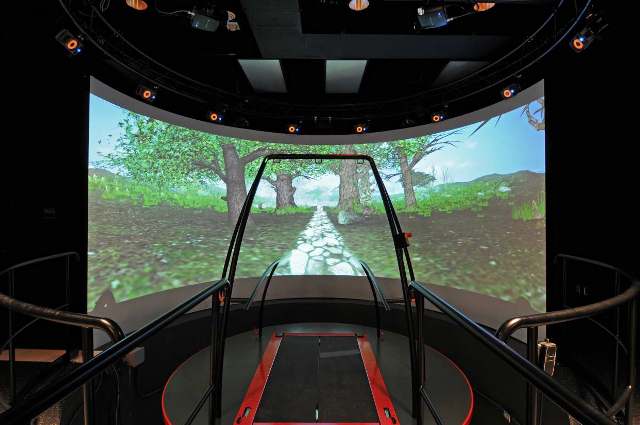Virtual Reality System a Fun, Immersive Tool for MS Physical Therapy


Scientists from Amsterdam-based Motek Medical developed an innovative virtual reality system that allows clinicians to see and analyze a patient’s balance, locomotion, and coordination – a tool that could reshape rehabilitation and clinical studies, as the system allows the patient to experience challenging and dynamically changing physical therapy in a controlled, safe setting. Now, the CAREN (Computer Assisted Rehabilitation Environment) system is available in Cleveland Clinic thanks to a grant from the state of Ohio, which is its first nonmilitary installation in North or South America. Leading the clinic’s CAREN system initiative is Jay Alberts, Ph.D.
Getting diagnosed with a chronic, progressively debilitating disease such as multiple sclerosis is a multi-faceted challenge, including concerns with self-management of the disease, and trying to keep a positive outlook amidst deteriorating physical ability. Depression is one of the most overlooked symptoms of multiple sclerosis (MS), compounded by feelings of hopelessness and loss of independence, and a sense of isolation from normal life. The CAREN system may be a win-win solution for both medical provider and MS patient, as it integrates research and rehabilitation into an enjoyable, immersive activity.
The CAREN platform operates on a “6 degrees of freedom” motion base that can turn and move up, down, left and right. The base is a treadmill, surrounded by real-time motion capture that syncs with visuals and surround sound. Patients can be required to walk down a path, davigate a boat, walk through an airport, or any other normal day situation without fear of injury, or without placing a limit on professional monitoring. The CAREN system in Cleveland was opened to patients in September 2013, and Dr. Alberts said all the Parkinson’s and MS patients who have tried it enjoyed themselves.
[adrotate group=”4″]
“Challenges can be customized, with levels of difficulty automatically based on patient performance,” said Dr. Alberts in a news release. “The system registers and reacts more quickly than human perception, making microadjustments and even going into a soft shutdown as needed.”
The platform enables detection and transmission, evaluation, clinical analysis and rehabilitation of balance, together with the patient’s sensory abilities and engagement. The CAREN software combines all data collected by the hardware for the purpose of patient data and research, allowing for better evaluation of progress of therapy. It also has the ability to measure EMG muscle activation, which can help clinicians learn which muscle groups the patient needs more work on.
While the CAREN system has only been designed to meet the rehabilitative needs of patients with Parkinson’s disease and MS, its developers are already working on expanding its indication to include diagnostic capabilities, and as a treatment for other neurological and neuromuscular diseases. One of its pending indications would be to assess return-to-play decisions for concussed athletes.






